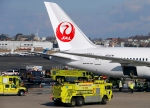Fire At Boston Airport Damages Boeing 787's Reputation

The Boeing 787 is a revolutionary airplane that saves 20 percent in fuel consumption compared to the older models it's intended to replace. One of the ways it’s designed to save energy is by making extensive use of electrical power instead of powering many onboard system directly from the engines. But now the very batteries that are one of its most innovative features are putting the plane in trouble.
A Japan Airlines 787 caught fire on Monday at Boston’s Logan airport. Firefighters who rushed to the plane’s parking spot reported that a fire had started “in the avionics compartment underbelly,” where much of the electronic equipment is housed, and that the fire began in a battery used to power the plane on the ground, according to the Boston Globe.
Firefighters encountered heavy smoke, and one of them was injured, airport officials said. The fire was extinguished within an hour, and nobody else was hurt, as the plane was empty and parked while waiting for its return flight to Tokyo.
This is not the first battery-related incident for the 787, a runaway commercial success for Boeing (NYSE:BA) that has been plagued by a string of mishaps after entering service years late, mostly because of the complexity of manufacturing large-scale composites.
In 2010, a test flight was interrupted because of a fire in a battery compartment that resulted in a grounding of the test fleet and a six-month program delay.
Late last year, a United Airlines 787 made an emergency landing in New Orleans after an electrical problem in midflight, and power panels had to be replaced on other 787s. Both United and Qatar Airways grounded some of their new jets because of electrical problems.
And in an unrelated issue, the U.S. Federal Aviation Administration ordered in December an inspection of all the 787s in service -- just 38 planes at the time, with airlines in the U.S., Middle East, Africa, Latin America and Asia -- after reports of fuel leaks.
Boeing said in a statement it was aware of the Boston incident and “working with our customer.” The plane involved in the fire was brand new, having been delivered in July 2012, according to Airfleets.net. The extent of the damage is not known.
After the Boston incident was reported around noon Monday, Boeing shares accentuated their decline for the day on Wall Street and one hour before the end of trading were losing $1.6 at $76.09.
The 787’s main competitor, the Airbus A350, is scheduled to make its first flight this summer and will not enter commercial service until well into 2014.
© Copyright IBTimes 2024. All rights reserved.






















